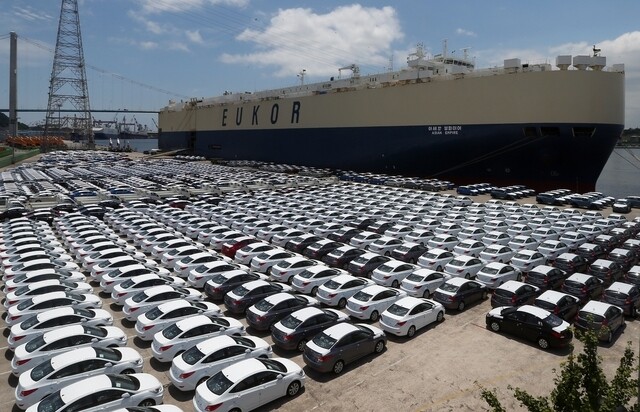
Hankyoreh material photo
Despite the sluggish domestic automobile production decline for 4 consecutive years, it jumped to the 5th place in world production by minimizing the aftermath of Corona 19. In terms of domestic sales, it was the only major country to show an increase. The Ministry of Trade, Industry and Energy announced on the 14th that the annual automobile production in Korea was 3.15 million units, down 440,000 units (11.2% ↓) from the previous year in the 2020 automobile industry trend. In the first half alone, production fell to 19.8% compared to the same period last year. Consumption sentiment sharply contracted as the Corona 19 began in earnest, and product procurement was disrupted as part manufacturers were hit by a pandemic. In the second half of the year, automakers’ new car sales effects, and so on, decreased production by 2.2%. Domestic automobile production has been on the decline for the fourth year. In terms of domestic production, production decreased significantly, but it showed the lowest rate of decline except China (-3.0%) among the world’s top 10 automobile producers. India (-33.4%), Germany (-28.2%), Mexico (-23.5%), and the United States (-20.8%) saw their production decline by more than 20%. While doing’advancing’ compared to major automobile producers, the country’s production ranking also raised two steps from 7th to 5th in 2019. In terms of sales, it sold 1.89 million units in domestic demand, and rather achieved the highest record for a year. It was an increase of 110,000 units (5.8%) compared to the previous year, the only increase among major automobile countries. Exports also sold 1.89 million units, the same as domestic demand, but compared to the previous year, 510,000 units (21.4%) decreased. By the way, in terms of exports, the total was $37.73 billion and $41.1 trillion), a decrease of only 13.0% ($5.1 billion) from the previous year. This is because the export unit price per unit increased by 10% compared to the previous year as the proportion of sports utility cars and eco-friendly cars with relatively high export prices increased. The Ministry of Industry said, “In the domestic market, the industry has introduced a variety of new cars, and the government’s individual consumption tax cuts and other policies to revitalize domestic demand have had an impact.” “ By car type, eco-friendly car sales have risen markedly. In particular, the domestic sales volume was 227,000 units, an increase of 58.7% compared to the previous year. The proportion of eco-friendly cars to the total car sales also reached 12%, entering the first double-digit range. Regardless of vehicle types such as electric vehicles, hydrogen vehicles, hybrid vehicles, and plug-in hybrid vehicles, the trend has been increasing. Eco-friendly cars also sold 276,000 units in exports, accounting for 19.1% of all passenger cars exported. In particular, EV sales have grown to 60.1% year-on-year, emerging as a major export vehicle. Last year, sales of eco-friendly vehicles were record highs in both domestic and export. By Hong Seok-jae, staff reporter [email protected]
